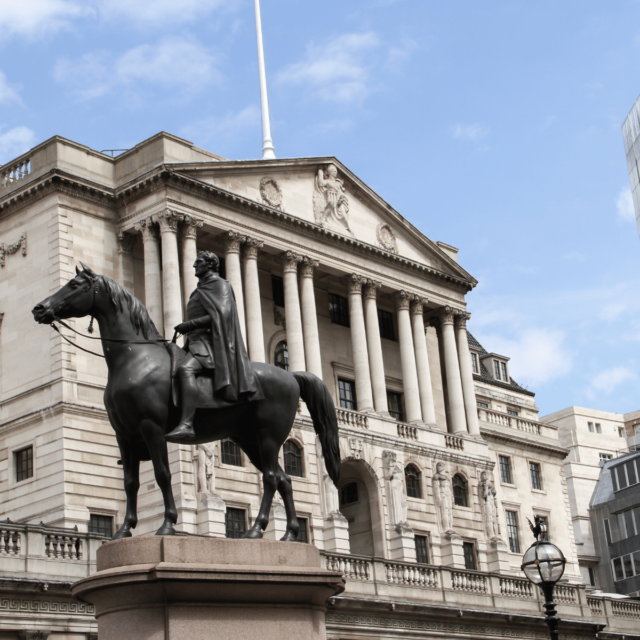George Osborne is committing to the wrong target
This is a guest blog by Professor Alasdair Smith, Professor Emeritus of Economics (and former vice-Chancellor) of the University of Sussex.
George Osborne proposes to pass a law enshrining his fiscal target of a balanced budget in ‘normal’ times. This proposal is at first sight paradoxical. Why should a government pass a law requiring it to do what it wants to do?
As always with Mr Osborne, there’s the political objective of making life uncomfortable for the opposition.
This is a guest blog by Professor Alasdair Smith, Professor Emeritus of Economics (and former vice-Chancellor) of the University of Sussex.
George Osborne proposes to pass a law enshrining his fiscal target of a balanced budget in ‘normal’ times. This proposal is at first sight paradoxical. Why should a government pass a law requiring it to do what it wants to do?
As always with Mr Osborne, there’s the political objective of making life uncomfortable for the opposition.
But there’s a more positive objective. Smart politicians want people to believe they will stick to their promises; and a commitment device makes promises more credible. Like Odysseus, Osborne wishes to be tied to the mast. Handing control of UK monetary policy to the Monetary Policy Committee of the Bank of England was a commitment device which, at least for its first decade, was regarded as a great success.
It is, however, essential, that the policy being carved into legislative stone should be sensible, and a significant element of Mr Osborne’s commitment is simply bad economics.
Government spending has to be financed either by taxation or borrowing: in other words, if it is not paid for by the current cohort of taxpayers the bill falls on future taxpayers. There is a respectable case to be made that current expenditure should normally be covered by taxation – it’s the current population who get the benefits, so they should pay the costs rather than passing them on to future taxpayers. That’s the rationale for a fiscal commitment to balance the current budget.
The problem is that Mr Osborne wishes to commit to a balanced overall budget, in which all government expenditure, including capital expenditure, would be covered by tax receipts. The present level of public sector net investment is around £30 billion, 1.6% of GDP, compared with an overall government deficit of around £70 billion.
Public investment in schools and roads delivers benefits for future generations, so the argument that we should not pass the costs of our expenditure on to later generations does not apply. It is entirely fair that the costs be passed forward to future taxpayers who are the beneficiaries, by financing the investment by borrowing.
Moreover, because the government can borrow at a rate of interest less than the expected growth of GDP, loan-funded investment is actually a better deal for future taxpayers. The real rate of interest on long-term borrowing by the UK government is about 1%; while the OBR expects real income to rise at about 2.5% per year. If public sector investment continues at 1.6% of GNP, and is financed by 20-year borrowing, taxpayers in 2035 would face a bill of £37 billion to pay off the 2015 investment of £30 billion, but this is £10 billion less than if they paid the cost of the 2035 investment.
The funding of capital expenditure does not figure prominently in discussions of deficits and debts because £30 billion is only 1.6% of national income, less than 4% of overall government expenditure. But £30 billion is almost half of the government deficit. Since the low-hanging fruit should be picked first, a fiscal adjustment of £70 billion will be at least twice as painful as the £40 billion adjustment need to bring the current budget into balance.
The years of transition from loan-funded capital investment to tax-funded capital investment are years in which taxpayers bear a double burden – paying for this year’s investment, and paying off the loans which funded earlier investment. That double burden will last well beyond 2020.
We already know that balancing the current budget is going to require painful decisions that affect children in poverty, low-income working families, school budgets, prisons and access to justice. But balancing the current budget means we’re not passing these burdens on to future taxpayers.
Balancing the overall budget increases the costs passed on to future taxpayers: we are being asked to make sacrifices that make later generations worse off. As Talleyrand might have said, this would be worse than a crime, it would be a blunder, a blunder generated by faulty economic logic.
It is entirely reasonable for the government to aim for a target that is more demanding than current balance: to repay borrowing associated with past investment or with past current deficits. The mistake is to include the financing of the current year’s investment in the target. One of the consequences of the mistake can be seen in the OBR’s projections for future investment – the level is to be kept at its current low level for the next five years.
Furthermore, if governments cannot borrow to fund investment, they will be tempted to find other ways of passing the costs on to future taxpayers, so there will be a strong incentive to get investment costs off the books by using PFI schemes. The problem with this is that PFI investors require a much higher rate of return on their capital than the gilt rate at which government can borrow – perhaps between 2% and 4% above the government borrowing rate depending on the composition of the PFI funding.
It is inconceivable that a high proportion of public investment could be put through the PFI route, but every £1 billion so funded will cost future taxpayers something in the region of £2.2 billion of PFI payments rather than £1.2 billion of gilt repayments. An even bigger blunder!
A major failure of macroeconomic policy in the period since 2008 has been the holding back of public investment. With interest rates at historic lows, monetary policy has weak counter-recession effects. A fiscal response to the recession has been limited by the weakness of the government’s financial position – how can a government with a large deficit cut taxes or raise expenditure? The one area of fiscal policy where it has a degree of freedom is in capital expenditure, precisely because extra capital spending does not weaken fiscal sustainability. Sadly, the UK government did not take advantage of this one degree of freedom; and it should not now saddle itself with a rule that codifies the error.
The Chancellor in his budget speech noted that in 2010 at a time that he was looking at every possible way of cutting expenditure, he rightly rejected advice to stop the Crossrail and Crick Institute projects. His instinct was right that important investments in national infrastructure should be treated differently from day-to-day expenditure. It’s a pity that his instinct has not been translated into his fiscal target.



















